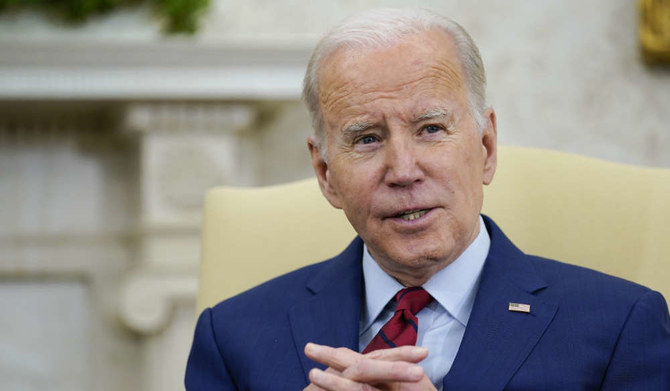
It takes a lot to take on two superpowers at once. The great conflicts of the 20th century serve as cautionary tales for those that attempted it in the past. In the First World War, Imperial Germany believed it could hit France quickly before turning to Russia, only to find itself bogged down in a two-front war. Two decades later, Adolf Hitler gave up trying to invade the UK before turning on the USSR, only to see his Third Reich destroyed by a British, American and Soviet pincer. Perhaps heeding these lessons, during the Cold War, Richard Nixon recognized the strain of confronting both Moscow and Beijing simultaneously and so pursued detente, taking China out of the Cold War and aiding Washington’s ultimate victory.
Joe Biden, it seems, is currently overlooking these lessons from the past. If anything, he is performing a “reverse-Nixon” — antagonizing China while already confronting Russia. In recent weeks, the US president has labeled China’s leader, Xi Jinping, a “dictator,” a comment that outraged Beijing. This is the latest in a series of confrontational positions adopted by the US, including persuading the G7 to agree to “de-risk” their economic involvement with China, signing the AUKUS military alliance with Britain and Australia, and restricting the activities of Chinese companies like Huawei. Washington now sees China as a strategic threat and is acting accordingly.
However, is this the wisest move for the US’ other major geopolitical confrontation, with Russia over Ukraine? While the cold war with China is slowly escalating, the hot war with Russia is already underway. Though the US is not fighting directly, it has sent more than $80 billion in aid to Kyiv, mostly military supplies, and has led the West’s effort to support Ukraine and sanction Vladimir Putin’s Russia. Biden has framed the conflict over Ukraine as a test for America, Europe and the whole world, making it a war he cannot afford to lose.
Most observers agree that China is by far the best-placed state to broker an eventual deal between Moscow and Kyiv
Christopher Phillips
But how might the war end? Biden would love for Ukraine to force Putin to the negotiation table after being humiliatingly defeated. But Russia might instead regain the upper hand and force concessions from Kyiv. Alternatively, a slow, grinding stalemate might lead to a compromise peace. Whatever the outcome, negotiations will eventually be necessary — and that is where China comes in. Most observers agree that China is by far the best-placed state to broker an eventual deal between Moscow and Kyiv.
Beijing has already issued a tentative 12-point peace plan. Putin is a close ally of Xi, who is one of the few people that might be able to get the Russian president to shift his position. Meanwhile, though Xi only spoke to Volodymyr Zelensky for the first time in April, the Ukrainian president described the call as “meaningful” and appeared open to China brokering an eventual deal — provided his conditions are met. It helps that China is Ukraine’s largest foreign trading partner, having also invested in several infrastructure projects.
While Beijing has made no secret of its friendship with Russia and has pointedly refused to condemn Putin’s invasion, it is widely believed that Xi wants to help end the war. China’s recent success in brokering a detente between Iran and Saudi Arabia points to its growing mediation abilities.
This is important context for Biden’s escalating war of words with Xi. If the US president is serious about the importance of the Ukraine war, then at some point he will need China to help broker a deal. Even if Ukraine wins a resounding victory, Putin is not likely to simply hold his hands up and admit defeat, and China will be needed to create some face-saving formulation for the Kremlin.
A more cautious and less confrontational approach to Beijing might make more sense for now
Christopher Phillips
Yet Washington’s hostility to China is helping to push Beijing and Moscow even closer. China continues to provide Russia with economic support for its war effort, not least purchasing more and more of its crude oil, as well as diplomatic cover at the UN. If anything, this is potentially prolonging the war and disincentivizing Xi from putting pressure on Putin to negotiate.
This is not to suggest that China is not a strategic threat to the US. As the era of unipolarity fades into the rear-view mirror and the world moves back to an age of multipolar competition, China is an obvious challenger to the US. However, there is a discussion to be had about prioritization. Given that the war with Russia is already underway, and it is one that Washington insists must be won, might it not be wiser to focus attention on Ukraine rather than escalate further on China?
Chinese mediation is likely going to be needed to eventually resolve the Ukraine crisis, so a more cautious and less confrontational approach to Beijing might make more sense for now. Taking on two superpowers at once rarely ends well and Biden might have more success ensuring Russia is defeated in Ukraine before pivoting to face China.
• Christopher Phillips is professor of international relations at Queen Mary University of London, author of “The Battle for Syria” and co-editor of “What Next for Britain in the Middle East?” Twitter: @cjophillips











